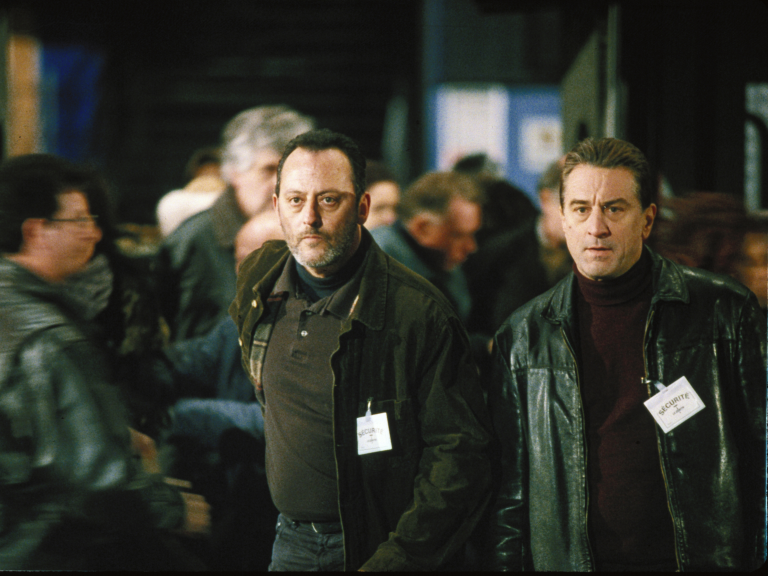The most striking facet of Javier Van de Couter’s “Thesis on a Domestication” is its absolute, unapologetic expression of its unnamed protagonist, a trans theatre actress essayed by real-life trans actress and author, Camila Sosa Villada. It’s a glorious creation, indelibly portrayed as Villada takes us through a full gamut of experiences, capturing the character’s fervent desires and repressed fears. She always seems to be perched on a line between exuberant no-holds-barred living and toeing the boundary of a regular life. Furthermore, she enters a relationship with a lawyer (Alfonso Herrera). She doesn’t think it’d get anything serious but the two increasingly gravitate towards one another.
Most crucially, the film feels integrated and locked into the protagonist’s way of thinking and being. Life and art seem almost intently inseparable. The lines between Camila Sosa Villada and the actress she plays blur playfully. It doesn’t matter how much of the scenes are fabricated. They have their kernel in the heat and complexity of everyday life and its push and pull, especially how those willing and eager to break away grapple with it. You can immediately tell how much of this film has been born as a true-blue collaborative hybrid between Villada and the director.
There’s a tussle at its heart between the folds of conventionality and rebellious transgressiveness. For her, the lawyer is home. He is an anchor to happiness and safety. But being with him-is it also taking her further and further away from her free-spirited, impulsive streaks? Their relationship, though, has an acknowledgment of it being an open one, both sexually exploratory with other people. She has flings with a theatre director, while there are implications that become heavily accented in a scene where he may still have his old thing going on with a friend. Nevertheless, the screenplay that Villada co-wrote with Van de Couter and Laura Huberman, based on her own novel, looks at neither party with any judgment. There’s an authenticity of palpable discomfort with which the actress chafes at the realignment of her life.

Is the relationship tying her down? The film illuminates with honesty, verve, and sass the projection of the central relationship, how it is alternately comforting and constricting. She yearns for freedom though the equation also brings her contentment. However, is this sense of complacency in domesticity what she wants? She’s often reckless, and moody. He grounds her. Or is it a leash? The film is vividly alert to destabilizing notions of a conventional relationship, offering a surging independence to its heroine. Her choices stay at the forefront of the narrative and don’t really strap themselves to neat plot delineations.
The film respects her individuality, and her jostling conflicts and keeps itself porous to ambiguities in her decisions. It’s all a hot mess she is in, navigating the friction between stability and confusion over what sort of person she ought to be. There are no predeterminations with which her life is undergirded. She has had a rough, rocky life, shards of which come through. On transitioning, she had to prostitute herself to fend for her survival. The film doesn’t chart her leap into acting. We are taken right into the middle of it at the very outset of the film.
As the couple advances towards parenthood and its responsibilities, there are strains between them. Especially she has to make sense of her life which goes through a churn. She is torn and desperate and bursting with the desire that isn’t sure of how it can be channeled when put in domesticating configurations. Villada is absolutely sublime and fierce as a person who doesn’t get bogged down by explaining her needs. What falls flat is the acting portions, coming off as redundant. “Thesis on a Domestication” is powered by the sexually vivacious and emotionally rooted chemistry between Villada and Herrera. Together they bring passion and fire up the narrative, rescuing it from flabby flashback patches and uneven snatches of toxic ties.






![Anhell69 [2022]: ‘Venice’ Review – A Intimate and Melancholic Portrait of the Young Queer Scene in Medellin](https://79468c92.delivery.rocketcdn.me/wp-content/uploads/2022/09/A69_02-768x432.jpg)
![Aadai [2019] Amazon Prime Review – A muddled Feminist Drama](https://79468c92.delivery.rocketcdn.me/wp-content/uploads/2019/08/Aadai-768x328.jpg)
